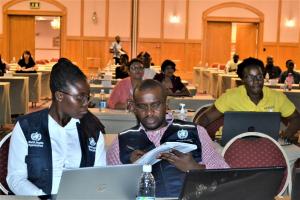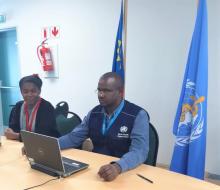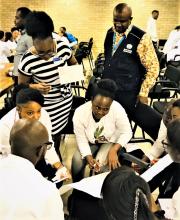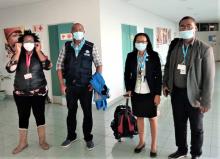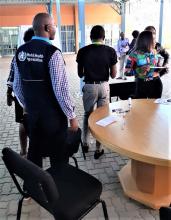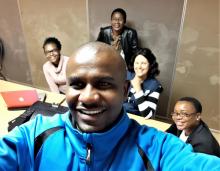Heroes from the Namibian COVID health front-line: An epidemiologist’s narrative
With contemporary times calling them disease detectives, epidemiologists play a central role in investigating patterns and causes of disease in humans. “In the context of the novel Coronavirus (COVID-19), as epidemiologists our focus lies in reducing the risk and occurrence of negative health outcomes through research, community education and health policy”, says Hilary Kagume Njenge, a Kenyan epidemiologist employed by the World Health Organisation emergency hub for east and southern Africa in Nairobi, Kenya.
With the COVID-19 outbreak, front-line staff, including epidemiologists, have found themselves to be essential parts of a health system that keeps the world in motion. This means providing care and services to vulnerable populations despite great risk. It is against this background, that Njenge joined the COVID-19 response team in Namibia on 11 March 2020 as an epidemiologist. “For front-line staff in emergency situations, being deployed comes with numerous trials and tribulations. This includes spending a substantial amount of time away from family and risking our very own lives. While this may be true, as healthcare workers, through planning and strategising with relevant stakeholders, our goal remains to ensure that many lives are saved, irrespective of the challenges we face in a specific environment or country”, says Njenge.
Given that COVID-19 is a serious obstacle in the Erongo region of Namibia, from 11-26 June 2020, Njenge was tasked to assist with supporting the investigation of chains of transmission in the Walvis Bay district. A crucial duty under this assignment was to work with the Ministry of Health and Social services (MoHSS), and produce an efficient response structure that would take control of the outbreak. In this sense, Njenge, together with MoHSS, initiated collaboration with pertinent partners to jointly identify resources and implement a joint COVID-19 response plan.
“In collaboration with regional and district administration, and local partners, we were able to identify several hot spots in the Walvis Bay district and start response activities. Some of these hot spots were the Kuisebmund area, the correctional facility and several fishing companies. As a result, over 100 cases were detected and documented within a week. These cases were isolated and their contacts quarantined. Consequently, this response at Erongo actually proved that Namibia was indeed experiencing community transmission within the Walvis Bay district and urgent attention was required in this district, including the revision of Namibia response strategy and Standard Operating Procedures”, reported Njenge.
Other significant achievements during Njenge’s mission in Namibia include, good cooperation and engagement with colleagues from MoHSS and other partners, the development of surveillance standard operating procedures, along with carrying out the training of health workers across the country using a practical approach that involves short lectures and simulation exercises. Apart from allowing participants to develop and practise the knowledge and skills acquired during the training, the mixed approach also aims at assisting the participants to build their confidence when playing their part during the COVID-19 response.
Njenge’s joy and hope is to see not only Namibia, but the entire globe beat COVID-19. He believes that front- line workers, such as epidemiologists, should continue to devote themselves to serving humanity in spite of the job being an extremely, tiring, stressful and overwhelming experience. Njenge says “I am most excited and privileged to be part of COVID-19 success stories in Namibia. Njenge proudly adds that through being an epidemiologist, he is eager to push the frontiers of health development in Namibia.



